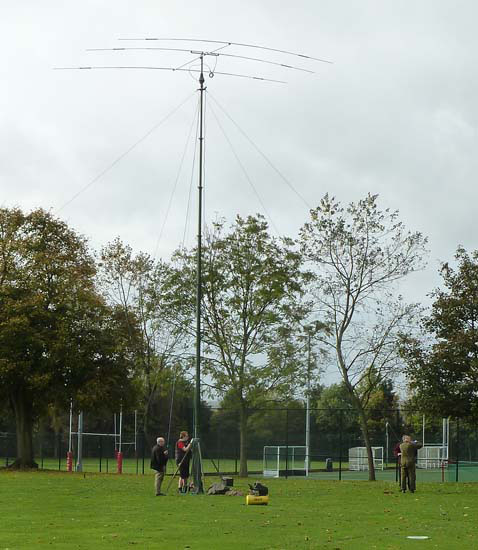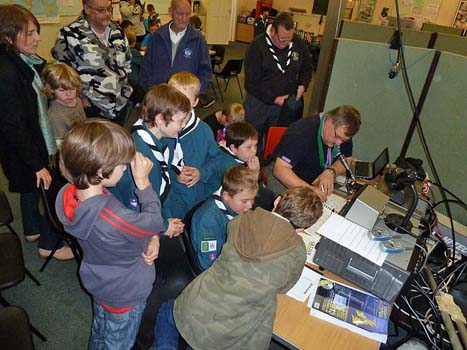
Wirral & District Amateur Radio Club
What is Amateur (Ham) Radio ?
Amateur radio is a popular technical hobby and volunteer public service that uses designated radio frequencies for non-commercial exchange of messages, wireless experimentation, self-training, and emergency communications. It is a hobby and service that brings people, electronics and communication together.
People use ham radio to talk across town, around the world, or even into space, all without the Internet or cell phones. It's fun, social, educational, and can be a lifeline during times of need and much more.
Besides your home address, you can set up an amateur radio station anywhere! eg. in a field ...

or a club station such as a special event for local Scouts ...

Although Amateur Radio operators get involved for many reasons, they all train to have a common basic knowledge of radio technology and operating principles, and are required to pass an examination for the Ofcom license to then be able to operate on radio frequencies known as the "Amateur Bands".
Who is a typical HAM
Amateur Radio operators come from all walks of life -- doctors, students, kids, politicians, truck drivers, movie stars, missionaries and even your average neighbour next door. They are of all ages, sexes, income levels and nationalities. Whether through Morse Code on an old brass telegraph key, voice communication on a hand-held radio or computerized messages transmitted via satellite, all hams use radio to reach out to the world.
You can communicate from the top of a mountain, your home or behind the wheel of your car, all without relying on the Internet or a cell phone network You can take radio wherever you go! In times of disaster, when regular communications channels fail, hams can swing into action assisting emergency communications efforts and working with public service agencies.
You can communicate with other hams using your voice and a microphone, interface a radio with your computer or tablet to send data, text or images, or Morse code, which remains incredibly popular. You can even talk to astronauts aboard the International Space Station, talk to other hams through one of several satellites in space, or bounce signals off the moon and back to Earth!
Some hams like to build and experiment with electronics. Computer hobbyists enjoy using Amateur Radio's digital communications opportunities. Others compete in "DX contests," where the object is to see how many hams in distant locations they can contact. Mostly we use ham radio to form friendships over the air or through participation in one of more than 2000 Amateur Radio clubs throughout the country. There are over 600,000 radio amateurs in the United States and over 2,000,000 worldwide.
Amateur Radio is the only hobby governed by international treaty.
As a radio amateur you are able to transmit radio signals on a number of frequency bands allocated specifically to the radio amateurs.
Radio amateurs make use of their frequencies in a number of ways:
Contacting people all over the world by radio which often leads to developing international friendships
Competing in international competitions to test how effective your equipment is, and how good you are as an operator
Technical experimentation — many of the leaps forward in radio technology have been initiated by radio amateurs
Communication through amateur space satellites or with the International Space Station (which carries an amateur radio station)
Providing communications at times of emergencies and undertaking exercises to ensure you keep the capability to do so.
There is no better way to explore the fascinating world of radio communications than by becoming a radio amateur.
A 1910 announcement by the then HM Postmaster General licensed “experimental wireless”, which still uniquely gives radio amateurs the ability to innovate without commercial or statutory controls even in the closely regulated environment of the 21st century.
Amateur Radio is the original high technology “social network”. Today it is regarded as a “broad church” and numbers in its ranks Kings, pop stars, public figures, the retired, schoolchildren and those at work or unemployed.
Whatever your interest in radio communications, you will find others sharing that interest — from “geeky” experimenters to those just interested in communicating by radio. So as a radio amateur, you simply do not know who you might talk to “over the air”. Using call signs as identifiers, there is no status on the air, and you talk, equal to equal, to everyone you contact.
Local radio clubs can help you grow and develop. And remember, Amateur Radio offers enjoyment for you and your family as well. Amateur activities like Direction Finding (similar to orienteering but with a high-tech “spin”), field days, Summits on the Air, IOTA can be “family friendly”, allowing your family to enjoy your amateur radio activities as well!
Whilst the Internet has brought us instant world-wide email, VOIP and video communication, it is tied to an infrastructure of enormous proportions.
With Amateur Radio, you are communicating directly, “point-to-point” with no intermediate infrastructure. You are also communicating with people in their cars, on ships, on remote islands, and in under-developed parts of the world. But perhaps more importantly, Amateur Radio is not just about communicating — it’s about exploring the technology that makes radio communication work — the electronics, the antennas, the propagation characteristics of the ionosphere, and even computers that are linked to radio equipment for all sorts of purposes including specialised modes of communication, station logging, propagation prediction, etc.
Employers in the high technology industries often seek people who combine the theoretical understanding of electronics with the practical ability to “make it happen”. By becoming a radio amateur, and with the right interest, a lifetime of personal growth lies ahead in the field of electronics and radio communication. Many people today owe career development to their first steps in amateur radio. Why don’t YOU consider joining the many thousands who are developing their skills every day through this fascinating hobby ?
Anyone can listen in to amateur radio transmissions. If you’re new to amateur radio, then listening-in for a while is a good way to get a feel for what is going on.
To become a radio amateur, licensed to transmit, you will need a brief period of study, and to pass a simple practical and theory examination.
In conjunction with radio clubs around the UK, the RSGB provides the examinations to enable you to become a radio amateur and then to progress through the various levels of licence — three in all. Study for the first level is straightforward and can often be accomplished in a weekend. More details about the exams can be found in our information for students.
The RSGB also publishes a range of books and provides on-line advice and guidance. The monthly publication RadCom is a “must have” for all aspiring radio amateurs.
Once you have obtained your first licence, the RSGB is there to hold your hand through the early days as a licensed radio amateur, and to provide advice and guidance as you progress.
Summary
Amateur Radio is a combination of technical expertise, operating skill, practical electronics and international camaraderie, all of which has fascinated and interested people for a hundred years. It is one of the few hobbies that is regulated internationally .. necessary because radio signals do not stop at national boundaries and many users share the bands.
Governments world-wide place a high value on Amateur Radio, encouraging enthusiasts to learn about electronics and to use radio allocations at low cost. This is despite the fact that they could sell the airwaves to companies prepared to pay substantial sums for access. Countries are aware that Radio Amateurs have always been a valuable source of operating skill and technical expertise in times of crisis.
From an individual point of view, Amateur Radio can be a stepping stone to a successful career in radio or electronics, and Radio Amateurs have pioneered technical advances in the use of communications radio which are in day-to-day use. Naturally, we claim Guglielmo Marconi himself as the very first Radio Amateur !
Today, many Amateur Radio Operators are involved in cutting edge digital technology with a world-wide packet radio network, satellites and not forgetting amateur television .. there really is something for everyone.
It is a hobby with so many facets, almost as diverse as the 2 million or so world wide licensees themselves.
If you would like to find out more about amateur radio then check out The Radio Society of Great Britain or if you would like more local information particularly about the Wirral & District Amateur Radio Club, please contact our secretary secretary@wadarc.com
Friday 8th May 2020
Now that people can take the UK amateur radio
Foundation exam online from their own home, what online training
courses are available?
Currently we are aware of two free online Foundation training courses.
If you are running an online course not mentioned here please let us know.
The courses so far are:
• Foundation Online run by Essex Ham
https://www.essexham.co.uk/train/foundation-online/
• GM6DX Foundation licence course
https://gm6dx.thinkific.com/
On April 3, RSGB announced that Foundation Practical Assessments have been
waived so candidates will not need to do them
https://rsgb.org/main/blog/news/rsgb-notices/2020/04/02/rsgb-to-introduce-remote-invigilation-for-foundation-exams/
The RSGB publication 'Foundation Licence Manual: for Radio Amateurs'
is available in Kindle format at
https://www.amazon.co.uk/Foundation-Licence-Manual-Radio-Amateurs-ebook/dp/B07QS7C68V
The RSGB Online exam remote invigilation FAQ describes how to apply for an
exam
https://rsgb.org/main/clubs-training/exam-faq/
|
As in most walks of life, passing the initial exam is the first stage to proving competence and experiencing the joys of an exciting hobby. It is often chatting with your peers who can add their life experiences and knowledge as a short cut to complete your personal enjoyment. We are unable at this moment in time to offer training and so one of the above courses would be an ideal way into the hobby, followed by taking the RSGB on-line exams. After your success, do consider coming along to WADARC for a few evenings (for no charge), and I'm sure we will be able to convince you how fulfilling and rewarding being a member of a good club can be. Our members operate in a wide range of radio and computer activities.
Keep checking our "Calendar of Events" on the club
website for the latest information |